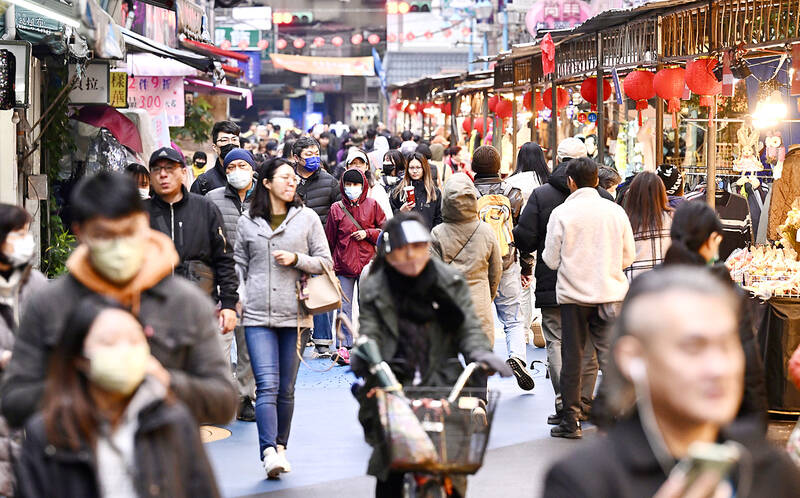Sales in the retail sector in the first two months of the year rose 4.3 percent year-on-year to NT$769.3 billion (US$24.14 billion), the highest for the same period on record, the Ministry of Economic Affairs said yesterday.
Sales for the first two months are reported together to factor out the effects of the week-long Lunar New Year holiday, when many businesses are closed. The holiday was in January last year, but in February this year.
Rising sales of vehicles and general merchandise due to a series of promotional campaigns before the Lunar New Year holiday, as well as higher revenue generated by convenience stores, were the main drivers, the ministry said in a report.

Photo: Peter Lo, Taipei Times
An increase in e-commerce and catalog sales as firms launched marketing campaigns before the holiday also contributed to the growth, it added.
For this month, the ministry forecast that the retail sector’s growth momentum would continue thanks to seasonal demand for clothing and related products and special sales promotions related to International Women’s Day and White Valentine’s Day.
Retail sales are to grow between 0.3 and 3.3 percent annually to between NT$371.6 billion and NT$382.7 billion this month, it said.
The food and beverage sector also posted record-high sales of NT$188.4 billion for the first two months, representing an annual increase of 5.7 percent, as holiday consumption benefited restaurants, while travel demand boosted catering services for international flights, the report said.
The sector’s sales this month are expected to fall from last month due to fewer holidays, but sales are likely to grow from a year earlier, up 8.8 to 11.8 percent to between NT$83.9 billion and NT$86.2 billion, as firms remain active in brand development and store expansion, it added.
Meanwhile, the wholesale sector witnessed a 9.1 percent annual rise in sales to NT$1.94 trillion during the first two months, mainly driven by demand for machinery equipment used to develop emerging artificial intelligence (AI) and high-performance computing (HPC) applications, the report said.
Higher steel prices and kitchenware shipments also boosted the wholesale revenue of building materials, while channel distributors and restaurants’ piling up inventory contributed to revenue growth in wholesale food, beverage and tobacco products, it added.
This month, the wholesale sector would see sales grow from a year earlier, up 5.8 to 8.8 percent to between NT$1.08 trillion and NT$1.11 trillion, due to stable domestic consumption and steady demand for new technology applications such as AI, the ministry said.

When an apartment comes up for rent in Germany’s big cities, hundreds of prospective tenants often queue down the street to view it, but the acute shortage of affordable housing is getting scant attention ahead of today’s snap general election. “Housing is one of the main problems for people, but nobody talks about it, nobody takes it seriously,” said Andreas Ibel, president of Build Europe, an association representing housing developers. Migration and the sluggish economy top the list of voters’ concerns, but analysts say housing policy fails to break through as returns on investment take time to register, making the

‘SILVER LINING’: Although the news caused TSMC to fall on the local market, an analyst said that as tariffs are not set to go into effect until April, there is still time for negotiations US President Donald Trump on Tuesday said that he would likely impose tariffs on semiconductor, automobile and pharmaceutical imports of about 25 percent, with an announcement coming as soon as April 2 in a move that would represent a dramatic widening of the US leader’s trade war. “I probably will tell you that on April 2, but it’ll be in the neighborhood of 25 percent,” Trump told reporters at his Mar-a-Lago club when asked about his plan for auto tariffs. Asked about similar levies on pharmaceutical drugs and semiconductors, the president said that “it’ll be 25 percent and higher, and it’ll

NOT TO WORRY: Some people are concerned funds might continue moving out of the country, but the central bank said financial account outflows are not unusual in Taiwan Taiwan’s outbound investments hit a new high last year due to investments made by contract chipmaker Taiwan Semiconductor Manufacturing Co (TSMC, 台積電) and other major manufacturers to boost global expansion, the central bank said on Thursday. The net increase in outbound investments last year reached a record US$21.05 billion, while the net increase in outbound investments by Taiwanese residents reached a record US$31.98 billion, central bank data showed. Chen Fei-wen (陳斐紋), deputy director of the central bank’s Department of Economic Research, said the increase was largely due to TSMC’s efforts to expand production in the US and Japan. Investments by Vanguard International

WARNING SHOT: The US president has threatened to impose 25 percent tariffs on all imported vehicles, and similar or higher duties on pharmaceuticals and semiconductors US President Donald Trump on Wednesday suggested that a trade deal with China was “possible” — a key target in the US leader’s tariffs policy. The US in 2020 had already agreed to “a great trade deal with China” and a new deal was “possible,” Trump said. Trump said he expected Chinese President Xi Jinping (習近平) to visit the US, without giving a timeline for his trip. Trump also said that he was talking to China about TikTok, as the US seeks to broker a sale of the popular app owned by Chinese firm ByteDance Ltd (字節跳動). Trump last week said that he had